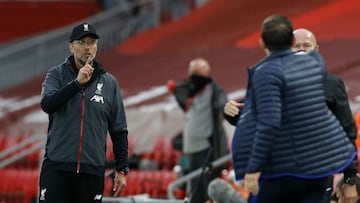Klopp: Liverpool boss says Chelsea's Lampard "has to learn"
After warning Liverpool against becoming "arrogant", Chelsea boss Frank Lampard has been told by Jürgen Klopp to keep his emotions in check after the final whistle.

Liverpool boss Jürgen Klopp says Frank Lampard was out of order to suggest the Reds are becoming "arrogant" after their Premier League title success.
Klopp said he could cope with any ranting and raving on the touchline, but he argued the Chelsea manager was wrong to carry on his criticism after the final whistle.
When he spoke to television after Chelsea's 5-3 defeat at Anfield on Wednesday, Lampard said Liverpool should be careful not to "get too arrogant" amid their achievements.
A challenge during that game, when Chelsea's Mateo Kovacic and Liverpool's Sadio Mané tangled, led to a heated shouting match between the managers as play carried on.
Lampard should not have continued row after final whistle, says Klopp
Klopp hit back at Lampard on Friday, saying: "We are not arrogant. Frank was obviously in a really competitive mood. I respect that a lot.
"You can say in a situation like that [during a match] what you want. For me, after the game it's completely over.
"He came here to win the game or get the point to get Chelsea's Champions League qualification.
"What he has to learn is to finish it with the final whistle and he didn't do that. Speaking afterwards about it, that's not okay.
"Frank has to learn. He has a lot of time to learn, he's a young coach, but that's what he has to learn. During the game, the words he uses, no problem at all."
Liverpool Football Club.
— Liverpool FC (@LFC) July 23, 2020
🏆🏆🏆🏆🏆🏆🏆🏆🏆🏆🏆🏆🏆🏆🏆🏆🏆🏆🏆🏆🏆🏆🏆🏆🏆🏆🏆🏆🏆🏆🏆🏆🏆🏆🏆🏆🏆🏆🏆🏆🏆🏆🏆🏆🏆🏆🏆🏆 pic.twitter.com/6ivOkQ9sd5
Lampard explained on Friday that he had regrets about some of the language he used during the game but said behaviour from Liverpool's bench had "crossed a line".
"We are not arrogant. We are pretty much the opposite"
Speaking at around the same time, Klopp underlined why Lampard should have kept his emotions in check after the game ended.
"We are not arrogant. We are pretty much the opposite of that," Klopp said. "But in a moment like this, how it is in all arguments, if you say something you want to hurt the other person.
Related stories
"But [after the] final whistle [you have to] close the book. He didn't do that and that's what I don't like, honestly.
"That's the only reason I am speaking about it is, otherwise there would be no word, but because he spoke afterwards I think it makes sense to explain what I mean."